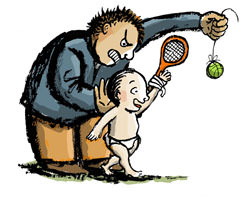Tips for parents

A few years ago the USTA published a very frightening statistic. 65% of all junior tournament players quit playing before they are 16 years old. Why? The answer is “Burn Out”.
“Burn Out” is not always from playing too much. The source can be the parents.
My definition of “Burn Out” is, the game is not fun and can’t handle the pressure any more.
Here a few tips to relieve the pressure and keep it fun for your kids.
1. Leave them wanting more. Most kids have a short attention span, especially under the age of 10. If they are just beginning to learn the game I recommend that you play with them no more than 20 minutes. Let them be the one to say, “One more, Pleeease?” When you hit with your kids, at any level, keep an eye on their body language. If they are walking around with their racquet head by their feet and their shoulders slumped, STOP! Pick up the balls. Hopefully you can stop before they get bad body language.
2. Avoid teaching them. We all want to help our kids, but taking a lesson from your parent is not much fun. Wait for them to ask for help before you try to teach them. If they never ask, then never teach them. If your kids are in a group or private lesson, then that’s the place for them to learn. When we teach our own kids, the information gets scrambled somehow.
I send my daughter to other pros. The information seems to get translated better from someone else.
3. Avoid post match criticism. Critiquing your child after a match is one of the leading causes of stress. Every time they play, they will know that you are watching every move they make. There is nothing, that you can say or do, that will change the results. They will not retain any criticism until they are in a calm environment. When they come off the court, you must make every effort to let them know that they are your child first and athlete second.
Charting a match helps. You can put it on their desk for them to look at later.
4. Keep your distance. The USTA recommends that you stay a minimum of two courts away. Some kids can handle their parent breathing through the fence, but most kids can’t and won’t say anything until it is too late.
Wear sunglasses so they can’t see you roll your eyes. If your child is looking at you after every point, you are too close.
5. Avoid talking about money. Another ingredient for pressure is, “We are spending hundreds of dollars on your tennis and you ……..” Talking about money doesn’t work, never has and never will.
“Burn Out” happens over time. Just be aware of some of the things you say and do on or near the tennis court.
Don’t let your child be a statistic.
Follow these tips and give your child a better chance for staying in the game and success.
By Barry Boren
www.webtennis24.com
